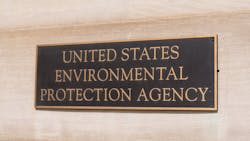EPA to stop GHG reporting for oil, gas and other large emitters
The US Environmental Protection Agency (EPA) Sept. 12 proposed discontinuing the Greenhouse Gas Reporting Program (GHGRP), which requires oil and gas companies and other major polluters to track their annual emissions from over 8,000 facilities, including refineries, compressor stations, and power plants.
The Trump administration's EPA, in a press release, said it had determined there was no requirement under the Clean Air Act to collect the GHG emissions information from most businesses and that continuing the over 20-year-old program was not "useful to fulfill any of the agency's statutory obligations."
EPA began collecting data from large industrial facilities and suppliers to give it a sense of US emissions to help inform climate policies, improve required national emissions estimates, and aid businesses in identifying opportunities for pollution reduction. The data allows EPA to track and compare facility-level emissions and assess sector-wide trends.
"The Greenhouse Gas Reporting Program is nothing more than bureaucratic red tape that does nothing to improve air quality," EPA Administrator Lee Zeldin said. The EPA said the proposal would save $2.4 billion in regulatory costs.
EPA proposes to remove all GHG reporting requirements, except for those subject to the Waste Emissions Program, passed by Congress in 2022. Congress pushed back the reporting requirement under the program—designed to penalize oil and gas companies that emit more than 25,000 tonnes/year (tpy) of CO2 equivalent—by a decade to 2034 as part of the recent Trump tax bill.
Nationwide, companies reported about 2.6 billion tpy of CO2-equivalent to the inventory in 2023, down about 4.4% from 2022. Petroleum and natural gas system emissions totaled 322 million tpy, according to the 2023 inventory, up about 1.4% from 2022 levels.
On its GHGRP website, EPA said the oil and gas sector is the US' largest emitter of methane, "a potent GHG with a global warming potential more than 25 times that of carbon dioxide, and is responsible for approximately one-third of current warming from human activities."
EPA noted that the oil and gas industry includes "a wide range of operations and equipment" subject to reporting, including onshore and offshore oil and gas production, petroleum refining, natural gas processes, oil and gas gathering and boosting, natural gas transmission and distribution and LNG export and import.
Several environmental groups, including the Sierra Club, threatened to sue.
Some worry that eliminating the reporting requirements threatens the growing carbon capture and storage industry because the government uses the inventory to determine eligibility for tax credits.
The proposal "will not advance carbon storage—something Administrator Zeldin has publicly supported," Jessie Stolark, executive director of the Carbon Capture Coalition, said in a statement. She said the proposed rule "endangers millions of dollars in investments from American businesses in these technologies."
Carbon management project developers have invested an estimated $77.5 billion in capital expenditures across the nation in existing and near-term projects, Stolark said, "far more than the $2.4 billion in savings cited by EPA."
About the Author
Cathy Landry
Washington Correspondent
Cathy Landry has worked over 20 years as a journalist, including 17 years as an energy reporter with Platts News Service (now S&P Global) in Washington and London.
She has served as a wire-service reporter, general news and sports reporter for local newspapers and a feature writer for association and company publications.
Cathy has deep public policy experience, having worked 15 years in Washington energy circles.
She earned a master’s degree in government from The Johns Hopkins University and studied newspaper journalism and psychology at Syracuse University.
